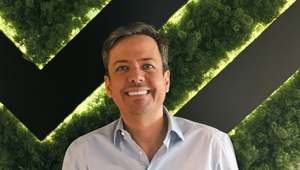
Bossing It: Being Equally Responsible with Gregory Mardikian

Gregory is a highly dynamic business & strategic development director with over 14yrs of experience within the GCC market working with some of the leading global ad Agencies.
Specialised in the activation and experiential discipline of marketing and advertising, understanding the importance of consumer engagement to achieve action-oriented results.
Gregory’s exposure spans across different industry segments including: Telecom, Banking, FMCG, and Automotive.
Currently leading VMLY&R COMMERCE in MENA and overseeing a portfolio of our clients in Dubai, Abud Dhabi and KSA, Gregory is committed to demonstrating his ability to grow the agency’s presence in the region and achieve results in acquiring new business.
LBB> What was your first experience of leadership?
Gregory> Being the eldest child in a family of boys is where, for me, natural leadership started forming. It was driven by my responsibility and protectiveness of my loved ones.
Also being born into a family of entrepreneurs gave me early visibility on how to lead by example and not by force. It was here that I learned that being involved in small things in my team’s life makes a big difference on their sense of belonging and productivity for the best of the business.
LBB> How did you figure out what kind of leader you wanted to be – or what kind of leader you didn’t want to be?
Gregory> All through my career, I’ve worked with different kinds of leaders with different traits.
My professional career started in the banking sector where I worked with leaders that take hierarchy very seriously and work in silos from their teams, but after moving to the advertising industry I started learning how leaders can work closer and be more involved in their team’s day to day.
I understood that the most productive leaders are the ones that guide and stay close to their teams, and I believe that Leadership is about getting work done through other people well and willingly; and to achieve this, people should be given the space and ownership to deliver. Every team member is the leader of their task.
By just giving orders and expecting results, leaders will be feared, and fear creates anxiety that affects productivity and the morale of others.
The best trait I believe a leader should have is being equally responsible for his team's well-being and the business function.
LBB> What experience or moment gave you your biggest lesson in leadership?
Gregory> One of the biggest moments was leading a live event in the deserts of Saudi Arabia. The event was on the 4th day of three sleepless nights of preparation. The exhaustion on people’s faces was clear and the edginess in their attitude was felt across the board.
Apart from absorbing all the stress from the client, I learned that managing people’s well-being is harder and more important than managing any workstream. When you have the right talents, you know they can deliver. But when you don’t have them in the right mental state is where the challenge lies, and the leader’s role becomes more crucial.
LBB> Did you know you always wanted to take on a leadership role? If so how did you work towards it and if not, when did you start realising that you had it in you?
Gregory> Sitting on board meetings as a kid and roaming around the family factory gave me the ambition to lead businesses.
I had to perform every worker’s job to understand and feel what they do in order to oversee and manage them effectively and fairly.
LBB> When it comes to 'leadership' as a skill, how much do you think is a natural part of personality, how much can be taught and learned?
Gregory> There are traits that come naturally and make every leader a great leader. I believe humility is one of the most important things that puts employees at ease when talking to you, and illuminates fear. That said, I do believe that personal experience, be it personal and professional circumstances, also contribute to shaping you as a leader, whether consciously or not.
LBB> What are the aspects of leadership that you find most personally challenging? And how do you work through them?
Gregory> I’ve always found that I can build very strong bonds with my team members, which is a very positive thing. However, if they are suffering from any personal issues, I find I take that on my shoulders too – it’s like I carry the weight of all my team – when everyone is good, everything is brilliant. When someone is not so good, it brings me down too. All I can do is be supportive and understanding but there is a balance to strike. And they say don’t take your work home with you – I can’t always abide by that rule, unfortunately.
LBB> Have you ever felt like you've failed whilst in charge? How did you address the issue and what did you learn from it?
Gregory> Always have a plan B and even C. This industry constantly throws curve balls our way and no matter how senior you get and further away from the day to day, there’s always a daily challenge or unexpected event to deal with. From a team member being sick to a client changing scope. Sometimes it can feel like an uphill battle, but by allowing time in the day to deal with the unexpected and ensuring you’re always one or two steps ahead of the ‘what if’s’ helps make the curve balls more manageable.
LBB> In terms of leadership and openness, what’s your approach there? Do you think it’s important to be transparent as possible in the service of being authentic? Or is there a value in being careful and considered?
Gregory> There is definitely a balance to maintain, but I believe every leader should still be authentic in their approach to any matter. To support the business and its goals, you must be open on things related to performance – be it business or people. Addressing them isn’t always easy but that’s life. However, managing the challenges and having an open mind and communication early on can help towards avoiding issues that never end well in any kind of relationship.
However, there are most certainly occasions that leaders can feel lonely as there are matters that they have to keep discreet and manage without creating chaos or relaying their worries to team members. Experience is what makes leaders calm at times of stress and uncertainty. Major things are not discussed, not so much to hide them but to avoid affecting the performance of team members that do not have sufficient experience to manage their emotions and need to proactively perform day to day tasks.
LBB> As you developed your leadership skills did you have a mentor, if so who were/are they and what have you learned? And on the flip side, do you mentor any aspiring leaders and how do you approach that relationship?
Gregory> I never had a mentor in the sense of someone mentoring me to become a leader. Along with the natural trait that grows with you, observation is what helps you deliberate and develop your leadership style.
I believe reading as well plays a very important role in moulding your attitude towards leadership, and I don’t mean reading books on how to become a great leader. Biographies of successful people always inspire you with new tactics or steer you in the right direction through their own life lessons.
LBB> It's been a really challenging year - and that's an understatement. How do you cope with the responsibility of leading a team through such difficult waters?
Gregory> As a boss, it’s about consistency. And not only checking in regularly regarding work but regarding their well-being. But it’s not all on one individual leader. To navigate such challenging times like we have in the past few years, the entire company has a role to play. In the most part, the leadership team, as well as having a culture whereby everyone genuinely cares about each other, has been a big support to each employee.
LBB> This year has seen the industry confronted with its lack of action/progress on diversity and inclusion. As a leader how have you dealt with this?
Gregory> Thankfully, diversity is a very important pillar in our organisation, and we are considered a very diverse agency. Our UK office won The Drum Diversity and Inclusion agency of the year, and that culture extends worldwide. Locally, our team is made up of around 22 nationalities and a 50/50 split between men and women across different specialisations and management levels.
LBB> How important is your company culture to the success of your business? And how have you managed to keep it alive with staff working remotely?
Gregory> Culture of an agency is driven by its people. We are lucky enough to have a brilliant Head of People, Chelly Megale, who stepped into the position pretty much as the pandemic hit. Having someone dedicated to the welfare of our teams has a massive impact on the support and added value that our employees receive. However, to be truly known for your culture is driven by the leadership and the trust in employees. I think every agency can claim a great culture and I believe VMLY&R COMMERCE has one of the nicest I have worked in.
LBB> What are the most useful resources you’ve found to help you along your leadership journey?
Gregory> Sitting with employees and chatting to them on non-business-related subjects. Don’t build walls and let your ego get in the way of being close to people.
The more you understand what each and every person goes through in their lives or at their job, the more likely you are to succeed and get the results you are aiming for.
Also, books, podcasts and real-time feedback are the best resources that any leader should keep picking up on their way upwards.















